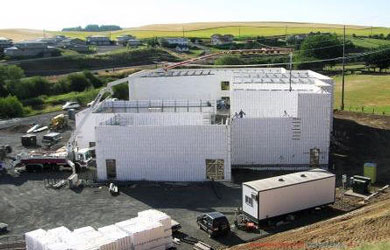Loading
Help for Commercial Projects
Other Concrete Sites
Environmental Benefits
Financial Benefits | Environmental Benefits | Health & Safety | Durability | Comfort & Quiet | FAQs
Not only do ICF buildings offer significant up-front and ongoing economic advantages, they are also quiet, comfortable, safe, and environmentally friendly.
 With ICFs, exposure to manufactured wood products is greatly reduced, thereby minimizing exposure to harmful volatile organic compounds (VOCs) and off-gassing, while mold resistance reduces health concerns.
With ICFs, exposure to manufactured wood products is greatly reduced, thereby minimizing exposure to harmful volatile organic compounds (VOCs) and off-gassing, while mold resistance reduces health concerns.
By offering environmental advantages, ICFs help to satisfy a growing public demand for sustainable architecture. ICF walls use no trees, since the concrete is manufactured from abundant natural resources. Concrete also makes use of fly ash, a coal byproduct that would otherwise be put in landfills. The high energy efficiency of ICFs lessens energy use, which leads to fewer greenhouse gasses and less dependence of overseas fuel sources.
![]() Click here for more information on the energy efficiency of ICF walls.
Click here for more information on the energy efficiency of ICF walls.


